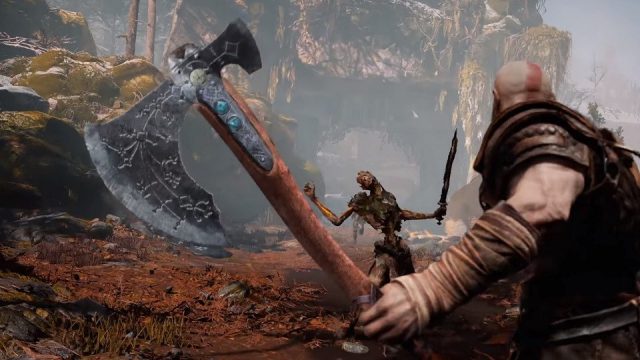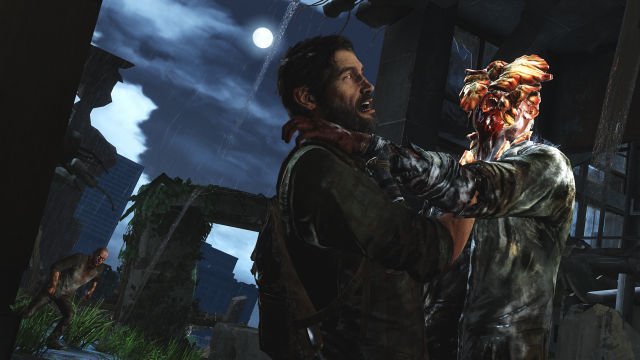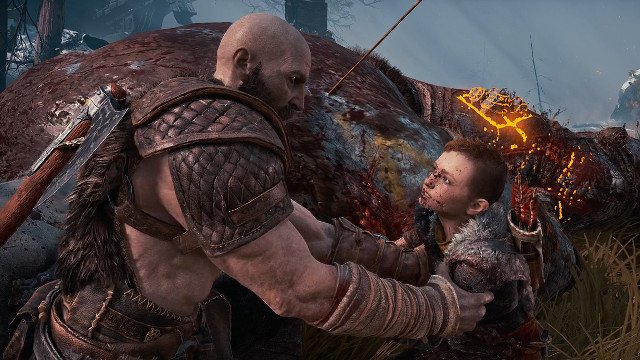God of War is a violent game. As you’d imagine when your protagonist is a seething demigod carrying his dead wife’s ashes to the top of a mountain filled with creatures that want to kill him, he isn’t exactly the happiest of bunnies, and he will chop your head clean off if you dare to stand in his path. However, the violence in the new God of War is handled differently compared to what we’ve previously seen from Kratos, and much like The Last of Us, it’s a game that doesn’t show away from showing the brutality of its world, yet contextualizes that brutality to make it feel more vital and necessary to the story it’s telling.
I enjoy ultra-violent games. There’s something uniquely cathartic about slicing through a barrage of nameless enemies, the immediate feedback of that violence making you feel like the star of your very own action movie. There’s nothing big nor clever about lopping off a guy’s head with a katana in GTA: Vice City, but it’s certainly darkly satisfying, and it’s not surprising that video games have therefore relied on violence in various capacities for decades now. It’s much easier to capture the attention of the player by allowing them to chop an alien in half with a chainsaw than it is to tickle their brainbox.
However, while plenty of us appreciate violent games, it does get a little boring after a while. With so many games asking you to shoot this guy or punch this other chap, it can get quite exhausting to play through games in which violence is the solution to almost every problem. The gaming industry’s shift to online multiplayer games has also ensured that this is the way it shall remain for the foreseeable future, with shooters, MOBAs and the like each placing players in battles to the death. With that being said, let’s talk about God of War, a game in which violence is the solution to every problem.

Okay, so while God of War is certainly a violent game, it’s the way that it incorporates that violence into its plot that makes it a heap more interesting than other modern games. Up until Santa Monica Studios got its hands on the character, Kratos had been a single-minded, vengeful asshole. It’s understandable why this was the case — he had been tricked into slaughtering his wife and child, then forced to wear their ashes on his skin for the rest of his life as punishment for his sins — although the character was decidedly one-note. He was mad as hell as he wasn’t going to take it anymore, and this anger fuelled his insatiable appetite for violence; he wanted to inflict pain on his enemies, so he did just that.
Kratos in the new God of War carries the weight of his past indiscretions on his shoulders, and while he is still filled with that anger, he’s now faced with the realization that this anger hasn’t really got him anywhere. Atreus’s behavior is reminiscent of Kratos’s past, with him finding it difficult to control his emotions and Kratos commanding him to remain focused. Everything about Kratos and Atreus’s relationship revolves around Kratos attempting to keep Atreus under control, with the father trying to subdue his son’s grief by telling him to steel himself, and chastising him when he lashes out.
Though Atreus isn’t accustomed to killing at the beginning of the game, he understands its necessity in the harsh environment that they live in. He cries when his father tells him to kill a wounded deer, though there isn’t much grieving reserved for the trolls and other assorted nightmares you come into contact with. However, in one exchange, Atreus is vocally uncomfortable with potentially having to kill humans during their journey. They need to kill animals for food and monsters to survive, though what is the benefit of killing humans, he wonders? They’re just trying to survive, too.

When Atreus eventually/inevitably kills a human, it’s a big deal. With Kratos physically comforting his son for the first time, clasping his arms in acknowledgment of Atreus’s pain in the most distant hug possible, there’s a mutual understanding between the pair that what he did was incredibly difficult. Compare this with the Kratos of God of War 3, who needlessly threw a nameless and innocent woman’s body into a crank mechanism and murdered her just to hold a gate open, and it’s clear that the demigod now has a different relationship with violence than he did during his previous rampage through Greece.
Kratos and Atreus’s reluctant acceptance that violence is a necessity in their world is reminiscent of The Last of Us, which saw Joel and Ellie adapting to a post-apocalyptic wasteland in which civilization had become just as vicious as the mindless infected steadily wiping out humanity. The Last of Us was an incredibly bloody game, though its violence was borne out of its protagonists’ struggle to survive. No skull caved in with a brick or Molotov thrown in the direction of gun-wielding baddies felt unnecessary, as Joel and Ellie needed to do that in order to ensure that they weren’t the ones on the receiving end. The violence felt crucial to the story Naughty Dog was trying to tell, replacing the throwaway waves of enemies players typically face in video games with an ongoing, desperate fight for survival.
Cartoonish violence certainly has its place in video games, though God of War and The Last of Us present stories in which an extensive amount of bloodshed makes sense within the context of their worlds. It’s an evolution of the mindless gore we grew up with, depicting characters who are affected by their actions rather than simply being vehicles for the player’s enjoyment. In God of War‘s case, players still get the satisfying combat, though this time around it’s conducted by a character who is forced to face the consequences of his actions, namely their impact on his son. Though some may argue that giving Kratos a moral compass betrays the spirit of God of War, it’s infinitely more interesting to watch his internal struggle play out than have him repeatedly punch a bunch of gods in the face again.







